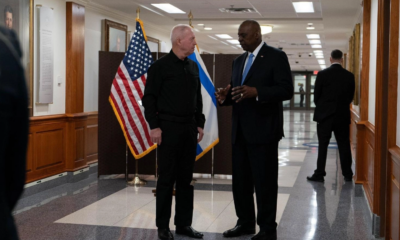
OpEds

Netanyahu’s challenge in Congress to unite frayed Jewry
Prime Minister Benjamin Netanyahu’s planned speech this month to the United States Congress poses a complex challenge for Israel. Not just to the Biden administration. Not only against Donald Trump. Not only to the West, which is exposed to violent antisemitic demonstrations organised by Hamas.
The speech poses a serious challenge to the US Jewish community. American Jewry opposes Israeli interference in US internal affairs. October 7 didn’t pass them by. The tragedy in the villages around Gaza and the war that followed, have deepened the crisis in the community, a crisis that may affect the identity and identification of the young Jewish generation in North America.
The recent article in The New York Times, written by Ehud Barak, Tamir Pardo, and company, “We are Israelis calling on Congress to disinvite Netanyahu” (26 June 2024) wasn’t aimed at diaspora Jews. It was tuned to the political identity of Israeli Jews. The authors fear that a good speech will strengthen Netanyahu, and therefore they demand that Congress cancel the invitation.
A warning light was turned on by the Institute for the Study of Global Antisemitism (ISGAP) when it discovered that the Bafrayung Fund, headed by Rachel Gelman, is among the main donors to the Westchester Peace Action Committee (WESPAC), which supported anti-Israeli groups and Hamas-inspired demonstrations on campuses all over the US. I don’t know Rachel personally, but I know her parents well.
Suzy and Michael Gelman are prominent leaders and major philanthropists in the Jewish Federations of North America system; chaired the Jewish community of Washington, D.C. for three terms; are active on the board of trustees of the Jewish Agency; and were among the founders of Birthright (Taglit). I’m familiar with their warm Zionist affinity and liberal worldview. Their perceptions are typical of many North American Jews attached to Judaism and the Jewish state. As I understand it, Suzy and Michael have established a philanthropic foundation through which their children can do whatever their heart desires. The apple turns out to have fallen as far from the tree as a golf ball flying out of bounds.
However, the wake-up call came from a friend who has dedicated most of his life to the prosperity of the Jewish community of New York. He excitedly told me that there are Jewish leaders who are encouraging members of Congress to leave the hall during Netanyahu’s speech. They are asking them to join the demonstrations against him outside the Capitol. “When Israel wobbles, all of Judaism trembles,” said my friend. “Many American Jews fear Trump, and worry that Netanyahu will play into Republicans’ hands. They hate Israeli meddling in American politics, even if they admit that the US administration doesn’t hesitate to step in the Israeli political arena.”
During the speech, hundreds of thousands of Hamas supporters are expected to demonstrate outside the Capitol, chanting, “Palestine from the river to the sea!” It won’t be a rose garden. Jewish leaders of major American Jewish organisations say that Jews who intend to join the demonstrations and encourage a Democratic absence are a handful of identified activists of the progressive Jewish lobby J-Street. They draw inspiration from and are helped by a handful of Israelis. The New York Times article revealed their identity.
Israel’s supporters don’t believe that many Jews will join the Hamas “river to the sea” call. Those who arrive will be swallowed up in the crowd. They take solace in the fact that even in 2015 during Netanyahu’s speech in Congress, about 60 Democrat delegates abandoned the plenary in protest at his appearance. In their estimation, the picture will be similar in 2024. The leadership of both parties signed the invitation to Netanyahu, so a significant Democrat presence is expected.
For decades, American Jews have given Israel a safety net. They have largely become a strategic asset. World War II gave birth to deep frustration that stemmed from their powerlessness to help their brothers in Europe. After the war, they came to their senses, and organised themselves.
On the eve of the Six-Day War, Levi Eshkol sought to characterise Israel, which hadn’t yet turned 20 as “shimshun der nebeckhdikehr” (poor Samson). A young country facing an existential threat, strong in spirit and determined to exist, ready to fight against enemies who seek its extermination.
The Jews of the world stood by the Jewish state as one. They came to volunteer in kibbutzim and moshavim to free reservists from the burden of their daily life. The power of the Jewish community in the US gained momentum after this war.
The unequivocal victory of the Israel Defense Forces (IDF) against Egypt, Jordan, and Syria added to the country’s national pride. In America, Jews, who had been excluded from leading universities, from private country clubs, from hotels and resorts reserved for Wasps (white Anglo Saxon Protestants) only, became more and more welcome.
Talented young Jews were absorbed into public service, in politics, in the media, and in academia. The same Wasps who, moments earlier, had opposed the reception of Jews to their clubs, began to take pride in brides and grooms of Jewish origin. Many of them, including American presidents, became grandparents to Jewish grandchildren.
This success worked in favour of Israel. During the Yom Kippur War, when Israel was undergoing one of its most difficult times, then secretary of state and National Security Advisor Henry Kissinger had a decisive influence on the American airlift sent to Israel, which changed the battlefield’s configuration. In the early 1990s, China, countries that had broken free from the Soviet bloc, and a significant part of the Third World, established relations with Israel because they believed that the road to Washington passed through Jerusalem. This in spite of the fact that the White House at the time acted against the re-election of Yitzhak Shamir, who was considered a right-wing, nationalist, and rigid leader.
This was mainly thanks to the unity of the Jewish people, thanks to the prosperity of the Jewish community in the US, and its visionary leadership headed by the iconic Max Fisher, and thanks to a thriving Israel. Jews who occupied senior positions in government were able to identify not only common values, but also tangential interests between the two countries, and strengthen their relations.
The events spurred by 7 October devoured the cards. Israel’s position as a regional power is eroding. The rift, the demonstrations in Israel, the shuffling on the battlefield, and the rise of antisemitism, are damaging.
Netanyahu must take advantage of the opportunity in Congress to strengthen the unity of the Jewish people, to recall the apples that have fallen far from the tree back to the roots. To tiptoe smartly between Biden and Trump. To make it clear to Americans and the free world that even though the Israeli Samson had a haircut on 7 October, he’s not a nebbish. That the Israeli soldiers fight bravely, and that the IDF stands resolutely at the head of the Western front, against the radical axis of evil led by Iran, Russia, China, and North Korea.
And, to the critics at home, they should be a little more patient and shoulder some more responsibility if the Jewish state is still dear to them.
Avinoam Bar-Yosef is president emeritus of the Jewish People’s Policy Institute, and former diplomatic correspondent and Maariv bureau chief in Washington.










